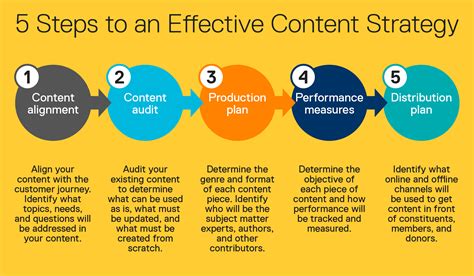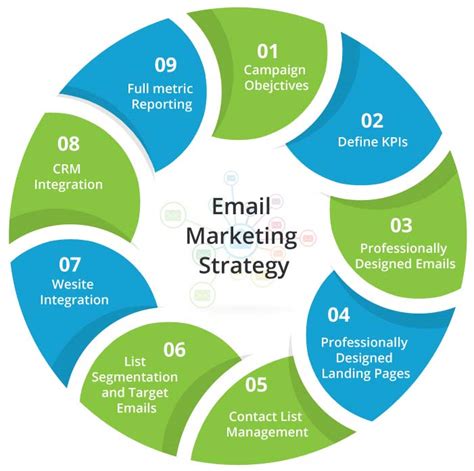With the rapid evolution of the digital landscape, businesses striving for prominence in the crowded online sphere have to constantly adapt their marketing strategies. The ability to capture and engage the attention of target audiences has become a paramount skill set for success in the modern era.
In today's hyperconnected world, a comprehensive understanding of digital marketing is indispensable. This entails more than just knowledge of the latest trends and tools. It requires the art of seamlessly blending creativity, innovation, and analytical thinking to deliver compelling messages that resonate with customers.
Embracing the Power of Storytelling: In the ever-unfolding digital ecosystem, standing out from the noise requires companies to harness the power of storytelling. By weaving captivating narratives, brands can captivate the hearts and minds of their audience. The ability to convey a compelling story, filled with emotions and experiences, can create a profound connection with potential customers.
The Art of Visual Seduction: In a predominantly visual world, incorporating visually striking elements into your digital marketing campaigns has a powerful impact. From eye-catching images to attention-grabbing videos, the ability to arrest attention in mere seconds is a fundamental skill. Visual content can not only captivate audiences but also enhance their understanding and retention of information.
Creating an Effective Content Strategy

An essential aspect of successful digital marketing lies in crafting a well-thought-out content strategy. Developing a content strategy entails formulating a plan to create and distribute engaging and relevant content to attract and retain a target audience.
One of the key factors to consider when creating an effective content strategy is understanding the preferences and needs of the intended audience. Identifying the target demographic and conducting in-depth research into their interests, pain points, and online behavior can help shape the type of content that will resonate with them.
Furthermore, a successful content strategy should involve establishing clear goals and objectives. Defining measurable targets, such as increased website traffic, higher engagement rates, or more conversions, will provide direction and allow for better assessment of the success of the campaign.
It is also crucial to ensure that the content created aligns with your brand's voice and values. Consistency in messaging helps establish trust and credibility with your audience. Determining the tone, style, and overall aesthetic that accurately represents your brand will assist in creating a cohesive and recognizable identity.
In addition to creating compelling written content, incorporating various forms of media can enhance the overall impact of the strategy. Utilizing captivating images, videos, infographics, or podcasts can make the content more visually appealing and shareable, increasing its reach and engagement potential.
Regularly analyzing and measuring the performance of the content strategy is paramount. Monitoring key metrics and evaluating the effectiveness of different tactics can help identify areas of improvement and guide future content creation efforts.
By following these principles and continually adapting to the evolving digital landscape, businesses can create and implement an effective content strategy that not only attracts and retains customers but also helps achieve broader marketing objectives.
Harnessing the Power of Social Media Platforms for Maximum Impact
In today's highly competitive digital landscape, an effective digital marketing campaign requires leveraging the immense potential of social media platforms. By strategically utilizing these platforms, businesses can amplify brand visibility, foster meaningful customer engagement, and drive substantial growth. In this section, we explore the key strategies and techniques that can help you make the most of social media to achieve unprecedented success.
Improving Search Rankings through SEO Optimization

Enhancing search rankings is a crucial aspect of optimizing SEO techniques. By implementing effective strategies, businesses can increase their visibility and attract more organic traffic from search engines. This section explores various approaches to improve search rankings and achieve better online presence.
1. Keyword Research and Optimization Identifying and targeting relevant keywords is the foundation of successful SEO. Thorough keyword research helps in understanding the language and phrases used by the target audience, enabling businesses to optimize their content with the right keywords. By incorporating these keywords naturally into page titles, meta descriptions, headers, and content, websites can enhance their organic search visibility and effectively communicate their relevance to search engines. |
2. High-Quality Content Creation Creating compelling and informative content plays a pivotal role in improving search rankings. Publishing unique, valuable, and relevant content not only attracts search engine crawlers but also engages website visitors. By regularly updating content with fresh perspectives, businesses can demonstrate their expertise and authority in their respective domains, increasing their chances of ranking higher in search engine results. |
3. Optimal On-Page Optimization On-page optimization involves optimizing various elements within webpages to improve search rankings. This includes optimizing meta tags, URL structures, heading tags, and ensuring proper keyword placement. By optimizing these on-page elements, businesses can improve their website's visibility to search engines, making it easier for them to understand the context and relevance of the content. |
4. Building High-Quality Backlinks Backlinks are an essential component of SEO, indicating the credibility and authority of a website. Acquiring high-quality backlinks from authoritative websites can significantly improve search rankings. By developing strategic partnerships and producing shareable content, businesses can generate backlinks organically. Additionally, guest blogging, social media outreach, and influencer collaborations are effective ways to build valuable backlinks. |
5. Mobile Optimization In today's mobile-centric world, optimizing websites for mobile devices is crucial for better search rankings. Responsive design, fast loading speeds, and mobile-friendly navigation contribute to an enhanced user experience. Search engines tend to prioritize websites that offer seamless mobile experience, making mobile optimization a vital aspect of improving search rankings and reaching a broader audience. |
Harnessing the Power of Influencer Marketing
In the ever-evolving landscape of digital promotions, harnessing the power of influencer marketing has emerged as a game-changing strategy that can elevate your brand's visibility, reach, and credibility. By tapping into the influential voices and personal connections of individuals with a strong online presence, businesses can effectively connect with their target audience in a more authentic and persuasive manner.
As one of the most potent forms of social media marketing, influencer campaigns focus on leveraging the loyal following and influence of influential personalities within specific niches or industries. By strategically partnering with these influential individuals, brands gain access to a massive pool of engaged followers, expanding their reach far beyond their organic audience. This powerful collaboration enables businesses to tap into an already-established community of trusted fans, increasing the potential for organic engagement, brand awareness, and ultimately, conversions.
One of the key advantages of influencer marketing lies in its ability to establish an emotional connection with the audience by utilizing the trust and admiration that followers have for their favorite influencers. Unlike traditional advertising methods, influencer marketing feels more natural and authentic to consumers, as they perceive the endorsement as a genuine recommendation from someone they trust and respect. This inherent trust significantly enhances the effectiveness of promotional messages, making them more persuasive and relatable.
Influencer marketing campaigns can take various forms, depending on the objectives and target audience of the brand. They can range from sponsored content collaborations, brand ambassador programs, product reviews, giveaways, or even exclusive discount codes. Regardless of the approach, successful influencer marketing campaigns require careful planning, thorough research, and effective communication with the influencer to ensure that the collaboration aligns with the brand's values, message, and target audience.
Ultimately, harnessing the power of influencer marketing allows businesses to tap into the massive potential of social media and its influential figures, enabling them to reach their target audience in a more impactful and organic way. By embracing the authenticity, credibility, and connectivity of influencer partnerships, brands can create highly successful digital marketing campaigns that drive brand awareness, engagement, and conversions.
Effective Strategies for Achieving Conversion in Email Marketing

In today's fast-paced digital landscape, businesses are constantly looking for innovative ways to boost their online presence and engage with potential customers. One powerful tool that has stood the test of time is email marketing. This section explores the different tactics that can be employed to ensure successful email campaigns that drive conversion.
1. Craft Engaging Subject Lines
Email subject lines are the first point of contact between your brand and the recipient. Creating intriguing subject lines that pique curiosity or offer value can significantly increase open rates and encourage readers to take action. Experiment with different styles, such as personalization or urgency, to capture attention effectively.
2. Segment Your Email List
The days of sending mass emails to all subscribers are long gone. By segmenting your email list based on demographics, preferences, or past interactions, you can tailor your messages to specific target groups. This personalization creates a more relevant and engaging experience, increasing the likelihood of conversion.
3. Design Compelling Email Content
When it comes to email marketing, design plays a crucial role in capturing the reader's attention. Use visually appealing layouts, incorporate eye-catching images, and maintain a clear and concise writing style. Highlight key selling points and include compelling calls-to-action to guide recipients towards conversion.
4. Optimize for Mobile Devices
In an increasingly mobile-driven world, it is essential to ensure that your emails are mobile-friendly. Mobile optimization involves using responsive designs, optimizing loading speed, and ensuring easy navigation on smaller screens. By catering to the growing number of mobile users, you maximize the chances of converting recipients who access emails on their phones or tablets.
5. Test and Analyze Performance
Continuous improvement is vital for email marketing success. Conduct A/B testing to analyze the performance of different elements such as subject lines, CTAs, or layouts. Use analytics tools to gather data on open rates, click-through rates, and conversion rates. By analyzing the results, you can refine your strategies to increase the effectiveness of future email campaigns.
Implementing effective email marketing strategies requires a combination of creativity, data analysis, and understanding your target audience. By employing these tactics, you can enhance the chances of converting your email recipients into loyal customers, resulting in a successful digital marketing campaign.
Tracking and Analyzing Data to Continuously Improve Your Marketing Campaigns
In the dynamic world of digital marketing, staying ahead of the competition requires the ability to adapt and make data-driven decisions. To successfully navigate this ever-changing landscape, it is crucial to track and analyze data to continuously improve your marketing campaigns.
Tracking and analyzing data allows you to gain valuable insights into the effectiveness of your marketing strategies, identify areas for improvement, and optimize your campaigns for better results. By leveraging the power of data, you can make informed decisions, enhance your targeting efforts, and ensure a higher return on investment.
Understanding Your Audience:
Tracking and analyzing data provides you with a deeper understanding of your target audience. By examining various metrics, such as demographics, user behavior, and interests, you can uncover valuable insights about your customers. This knowledge enables you to create more personalized and targeted campaigns that resonate with your audience, leading to increased engagement and conversion rates.
Monitoring Campaign Performance:
Data tracking allows you to monitor the performance of your marketing campaigns in real-time. By tracking key metrics like click-through rates, conversion rates, and bounce rates, you can assess the effectiveness of your campaigns and identify areas that need improvement. This ongoing evaluation enables you to make data-driven adjustments to optimize your efforts and increase campaign success.
Identifying Emerging Trends:
Tracking data over time allows you to identify emerging trends and changes in consumer behavior. By staying informed about evolving market trends, you can proactively adjust your marketing strategies to align with current demands. This flexibility and adaptability ensure that your campaigns remain relevant and impactful, keeping you ahead of the competition.
Testing and Iterating:
Data analysis empowers you to conduct A/B testing and iterate on your marketing tactics. By comparing the performance of different variations of your campaigns, you can identify what resonates best with your audience and refine your strategies accordingly. This iterative approach helps you optimize your campaigns for maximum effectiveness and achieve better results.
Measuring Return on Investment:
Tracking and analyzing data provides you with tangible metrics to measure the return on investment (ROI) of your marketing efforts. By calculating the cost per acquisition, customer lifetime value, and other relevant metrics, you can accurately assess the success of your campaigns and allocate resources effectively. This data-driven approach ensures that your marketing budget is utilized optimally, leading to better overall results.
By incorporating data tracking and analysis into your digital marketing strategy, you can continuously improve your campaigns, drive better results, and stay ahead in the competitive landscape. Utilize the power of data to gain valuable insights, make informed decisions, and optimize your marketing efforts for long-term success.
FAQ
What are some tips for creating a successful digital marketing campaign?
There are several tips to create a successful digital marketing campaign. Firstly, it is important to clearly define your target audience and set specific goals for your campaign. Secondly, you should conduct thorough market research to understand your competitors and identify unique selling points. Thirdly, utilizing various digital marketing channels such as social media, email marketing, and SEO can help to reach a wider audience. Additionally, creating engaging and relevant content, monitoring analytics, and constantly optimizing your campaign based on performance are essential for success.
How can I effectively reach my target audience through digital marketing?
To effectively reach your target audience through digital marketing, you should start by understanding their demographics, interests, and online behavior. This can be achieved through market research, surveys, and analytics. Once you have this information, you can tailor your content and advertising to match their preferences. It is also important to utilize targeted advertising, social media platforms, and search engine optimization strategies to optimize your reach. Additionally, engaging with your audience through personalized emails, social media interactions, and influencer collaborations can help enhance your campaign's effectiveness.
What metrics should I track to measure the success of my digital marketing campaign?
There are several important metrics to track the success of a digital marketing campaign. Firstly, website traffic and conversions can indicate the effectiveness of your campaign in driving users to take desired actions. Secondly, tracking engagement metrics such as click-through rates, time spent on site, and social media interactions can help gauge audience interest and involvement. Additionally, monitoring the cost per acquisition, return on investment, and customer lifetime value can provide insights into the campaign's profitability. Overall, the choice of metrics to track depends on the specific goals and objectives of your campaign.
What are some common mistakes to avoid in digital marketing campaigns?
There are several common mistakes to avoid in digital marketing campaigns. Firstly, neglecting to clearly define your goals and target audience can result in ineffective targeting and wasted resources. Secondly, failing to perform market research and competitor analysis can lead to missed opportunities and less effective strategies. Thirdly, overlooking the importance of creating engaging and relevant content can result in low audience engagement. Additionally, not analyzing and optimizing campaign performance based on data and metrics can hinder success. Finally, ignoring the power of mobile optimization and failing to adapt to evolving digital trends can limit the campaign's reach and impact.
How can I stay updated with the latest trends in digital marketing?
To stay updated with the latest trends in digital marketing, you can follow reputable industry blogs, websites, and social media accounts that specialize in marketing news and insights. Joining online communities and forums dedicated to digital marketing can also provide valuable information and a platform to discuss trends with peers. Attending industry conferences, webinars, and workshops can offer opportunities to learn from experts and network with professionals. Additionally, subscribing to newsletters and participating in online courses or certifications can help to deepen your knowledge and stay ahead of the curve.



